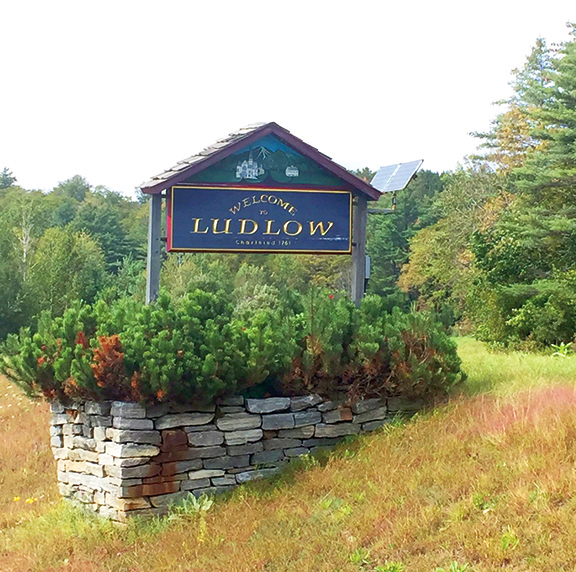LUDLOW, Vt. – On Monday, July 1, the Ludlow Selectboard met for their regular monthly meeting, covering a range of ongoing issues.
Municipal manager Brendan McNamara began the meeting by noting that the previous day had been Ludlow Fire Chief Peter Kolenda’s last day on the job, and thanking him for his 25 years of service. New Ludlow Fire Chief Ben Whalen, Ludlow’s first full-time fire chief, was present at the meeting.
The board then began discussions of the class 4 segment of Preedom Hill Road. As discussed at the previous meeting, the road is currently being used by ATVs, which, according to nearby residents, is causing significant damage. By Vermont statute, ATVs are allowed on class 4 roads, though this particular stretch of road is only accessible via a class 3 road, which are off limits to ATVs in Ludlow.

McNamara presented the board with two options for the class 4 segment: passing a class 4 road ordinance, or reclassifying the road as a trail. Each option, he explained, had pros and cons. A class 4 road ordinance would apply to all class 4 roads in Ludlow, which, McNamara told the board, was a relatively small amount of roads at “under five” miles. Board member George Tucker asked McNamara whether the ordinance would allow for different class 4 roads to have different rules, and McNamara confirmed that this was the case.
However, board member Scott Baitz noted that the issue is still one of enforcement. “We don’t enforce class 3 road [policy],” Baitz said, alluding to the fact that the ATV riders on the class 4 section of Preedom Hill are likely driving there illegally already on class 3 sections of the same road. McNamara concurred, saying that the ordinance is “not a magic fix.”
Board member Justin Hyjek preferred to “take these [situations] on a case-by-case basis, and not draft a policy for all five miles.” Hyjek asked McNamara if reclassification as a trail would allow the town to place boulders or bollards in front of the trail to block vehicle traffic. McNamara believed that this would be allowed, though he needed to investigate the issue further, and cautioned that emergency services may also need to access the trail if someone is injured while walking it. He also explained that reclassification as a trail would mean that the town would no longer be responsible for maintaining the road.
The board ultimately tabled the issue, as Baitz believed that a map of all Ludlow class 4 roads should be seen by the board before coming to a decision. McNamara agreed to provide such a map, as well as to draft both an ordinance and a trail reclassification option for the board to consider at their next meeting. Any such decision would also be subject to public hearings prior to enactment.
The board then allocated more of the town’s American Rescue Plan Act (ARPA) funds; $20,000 to Okemo Valley TV, to allow the community station to set up a low power FM radio station in the region, and $10,000 for the Black River Academy Museum. McNamara also told the board that alternative, non-ARPA funding had been secured for the relocation of the dog park to West Hill, returning $45,000 to the ARPA funding pool.
The town had intended to set its fiscal year 2025 tax rate, however, McNamara told the board that this would not be possible, as the town had not yet received the education tax rate from the state. A special meeting will be called to decide on the municipal tax rate once the education tax rate is received.
During this discussion, McNamara expressed frustration with the FEMA reimbursement process in response to a question from Baitz, describing it as “a struggle.” “To date, zero dollars from FEMA – nothing. And it’s not for lack of trying,” McNamara said. “The damage that dealing with FEMA has done to this community, in terms of funding, is horrific.” He explained that the town was now on its sixth FEMA project manager, each change of which necessitated bringing a new person up to speed and resubmitting the same information that had already been accepted by previous project managers, saying, “I’m sorry, it’s absurd.” As a result, McNamara said, “We can’t even help our people out if we want to by offsetting the tax rate, because we’re out two and a half million dollars, because we can’t get that money…a year after the fact. It’s upsetting.” McNamara noted that Sen. Peter Welch would be in Ludlow the following day, and he intended to speak with him about his frustrations.
Moving on, McNamara also updated the board on the Jewell Brook Dam projects. In terms of the overall rehabilitation of all five dam sites, he informed the board that he had held a “productive” meeting with the USDA recently, and that they were exploring funding options. This is a large, expensive project, estimated to cost around $40 million and to take 10 years.
For the more immediate concerns of the dam site 3 and 5 spillways, McNamara also had good news. He said he had recently held a meeting with an engineer who was “very positive regarding the current condition of the dams,” and that the repair project was completely funded. The project is now in motion, and being handled by the USDA Emergency Watershed Program.
The Ludlow Selectboard will hold their next regularly scheduled meeting on Monday, Aug. 5, at 6 p.m., in the Heald Auditorium at Ludlow Town Hall.